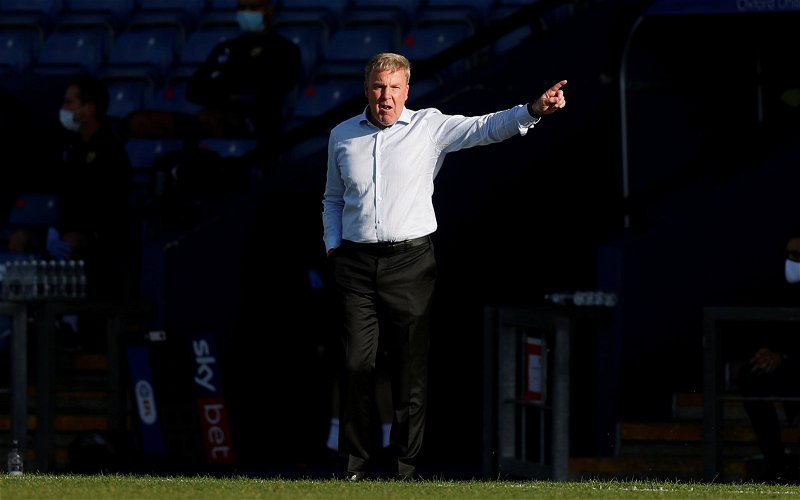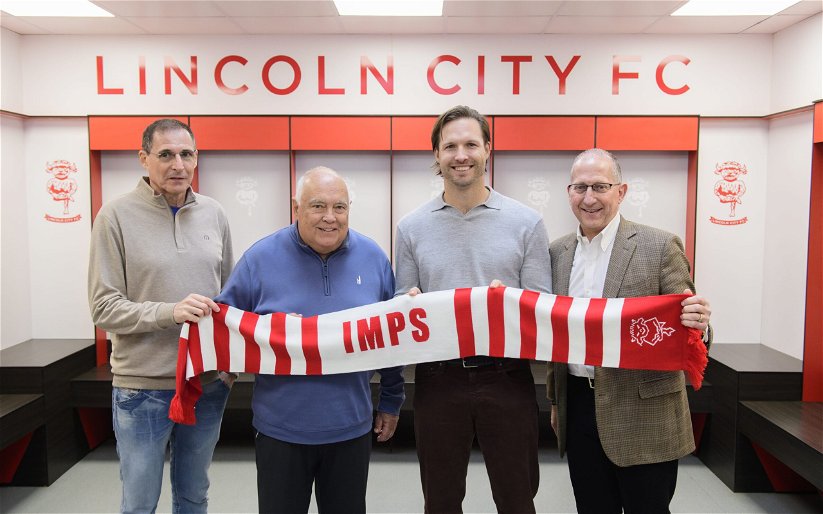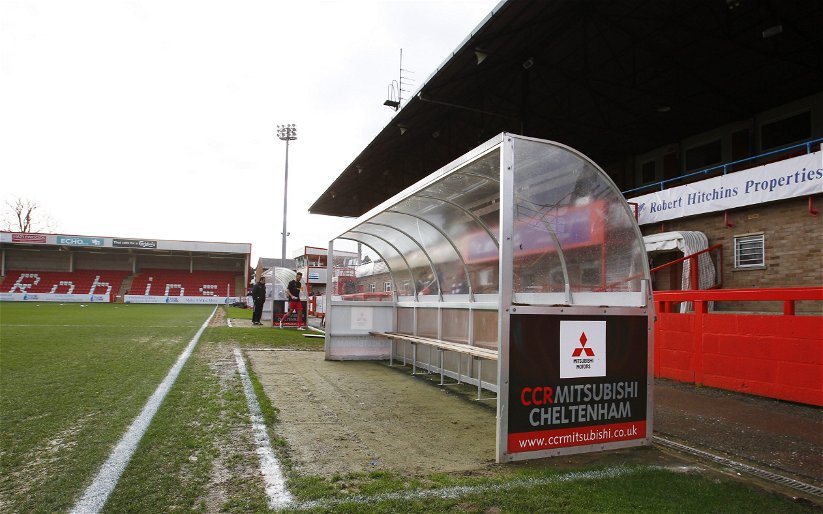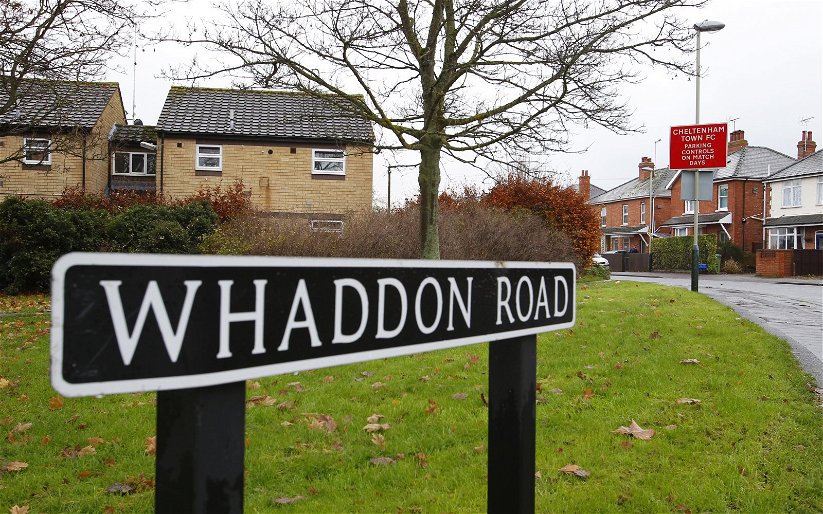Born in Watford where his wing-half father Frank had spent four seasons playing just after the war, left-sided wing-back Kenny Jackett spent his youth playing for junior side Bushey Rangers from the age of ten. He was invited for a trial with Watford in 1974 at the age of twelve and did well enough to be offered schoolboy terms in October 1976. It was the start of an association that would survive for almost three decades as player, coach and manager.
Jackett often speaks of his good fortune to be at the club when Graham Taylor arrived as manager in 1977. The coaching team at Watford included former Lincoln stalwarts Sam Ellis, Dennis Booth and John Ward, and Jackett acknowledges the influence they had on both his playing and managerial careers. Under their guidance, he progressed through apprenticeship in June 1978 before signing as a professional when he turned eighteen in January 1980. They were good times for Watford, who under Taylor’s innovative management went straight from the Fourth to the Second Division in successive seasons. Despite the momentum created by that run, Watford had struggled to establish themselves in their first season back in the Second Division, but were safe by the time Jackett made his debut. His playing career did not have the best of starts, coming on as a late substitute in a 5-0 away defeat at promotion-chasing Sunderland on 26 April 1980.
Jackett started the 1980-81 season in the side and remained a mainstay for the next nine seasons, a run broken only by the occasional injury. On 9 September 1980 he made his debut for Wales U21 in a 2-0 win in the Netherlands. Besides that landmark, the season was remarkable for two reasons. Firstly, Watford finished seven points behind the promotion places, but also seven points clear of relegation in an extremely tight division (two points for a win in those days). Secondly, there was a run to the quarter-finals of the League Cup that produced some extraordinary results. Having lost the second round first leg tie 4-0 to First Division Southampton, Watford hammered Saints 7-1 in the second leg to win 7-5 on aggregate. In the fourth round, they beat Nottingham Forest 4-1 at Vicarage Road. Southampton and Forest both finished in the top seven in the First Division that season, and in those days the big clubs took the competition seriously and fielded their best sides.
It was a sign of more to come. Watford barely missed a beat in 1981-82 as they won promotion to the First Division for the first time in their history. That season may be remembered by Lincoln supporters for an exciting 2-2 draw at Vicarage Road in the League Cup before Watford won the replay 3-2. First Division sides West Ham and Manchester United were beaten in the FA Cup. Watford won their first match as a First Division club, beating Everton 2-0 on the opening day. In their fourth home game, they thrashed Sunderland 8-0 to go third in the table. It was a good week for Jackett: three days earlier he had made his full debut for Wales in a 1-0 win over Norway in front of a paltry 4,340 at Vetch Field. Jackett also made his first appearance at Wembley later that season in a 2-1 defeat to England on 23 February 1983. Meanwhile, Watford kept the momentum going and incredibly finished second in the league, although eleven points behind champions Liverpool. They also had the pleasure of beating Liverpool on the final day, a game that is remembered as Bob Paisley’s last game before retirement.
It was going to be very difficult to equal those achievements in 1983-84, especially since top scorer Luther Blissett had been sold to AC Milan, but there were plenty more high points to come. Jackett made his European debut in the 3-1 UEFA Cup first round first leg defeat to Kaiserslautern and, despite the presence of West German star Hans-Pieter Briegel, Watford won the return leg 3-0 to go through. Watford then beat Levski Sofia before going out to Sparta Prague. Watford finished eleventh in the First Division but wins over Luton, Charlton, Brighton, Birmingham and Third Division Plymouth in the semi-final took them to the FA Cup Final for the first time in their history. Making his only appearance in a Wembley cup final, Jackett and his side were beaten 2-0 by Everton. It was at this point that Jackett first incurred the knee injury that would require a number of operations and would, unfortunately, end his career a few years later.
Watford got off to a dreadful start in 1984-85, failing to win any of their opening nine league games. They lifted themselves off the bottom of the First Division with a 3-2 win at Chelsea in October, and a run of six wins and two draws took them into mid-table. Watford eventually finished eleventh, and then twelfth in 1985-86 as they established themselves as an unremarkable but solid First Division side. And therein lay a problem. Manager Graham Taylor was still very ambitious and had designs on the England manager’s job. Coasting along in mid-table was never going to deliver that, and Watford turned in another ninth-place finish in 1986-87. The FA Cup provided some excitement, with wins over Maidstone, Chelsea, Walsall and Arsenal taking them to their second semi-final in four seasons. A 4-1 hammering by Spurs at Villa Park ended the run and perhaps also ended an era: at the end of the season, Taylor left Watford for Aston Villa.
With Taylor gone, the 1987-88 season was one to forget as Watford were relegated to the Second Division with a meagre seven wins all season. Taylor’s replacement Dave Bassett was sacked in January but to no avail. Ironically, their place in the First Division was taken by Taylor’s Aston Villa. It was also the beginning of the end for Kenny Jackett. In 1988 the knee injury began to recur, and despite several operations, it was never quite right. Furthermore, on 27 April 1988, he won his thirty-first and final cap for Wales in a 4-1 friendly defeat in Sweden. He never scored at international level, but has the distinction of being the most capped Watford player of all time, held jointly with team mate John Barnes. He appeared regularly in 1988-89 during the first season back in the Second Division, and Watford made the play-offs by finishing fourth. Watford drew 1-1 on aggregate with Blackburn in the semi-final but went out on away goals.
Jackett appeared only intermittently in 1989-90 as Watford finished fifteenth in the Second Division. Sadly, it was the lowest league finish of his Watford career and came at the end of a memorable decade. Eventually, the knee injury got the better of him and he decided to retire. The final game of his career came as a substitute in a 3-1 win over Blackburn on 31 March 1990. In total, he made 428 appearances for Watford, scoring 34 goals.
Fortunately, he had already completed his coaching qualifications and had started coaching on a casual basis a couple of years earlier. The next move was almost a given, although there was no formal appointment to begin with. He started helping out with the Watford youth team at the start of 1990-91 before being officially appointed youth team coach in January 1991 and then youth team manager in November 1991. He was promoted to assistant manager in July 1993 by new manager Glenn Roeder, although he reverted to youth team manager after a year.
In 1995-96 Watford dropped to the bottom of the First Division (by then the second tier) and Roeder was sacked on 20 February 1996. Graham Taylor returned to the club and promoted Jackett and Luther Blissett to assist him as first-team coaches. Already seven points adrift, not even Taylor could save Watford from relegation to the third tier. In May 1996 Taylor moved upstairs to become general manager with Jackett appointed team manager in his place. Jackett won his first game in management 2-1 at Bournemouth on 17 August 1996, and Watford sat second in mid-September. There was an astonishing twenty-two-game unbeaten run between 1 October 1996 and 1 March 1997 that kept Watford in the top five. Indeed, their nine successive draws away from home during that run created a Football League record which still stands. Once the run had ended, Watford slipped down the table to finish thirteenth, their lowest league finish since 1978.
Despite it being an interesting season in a number of ways, Jackett was demoted back to first-team coach at the end of the season. Jackett says it was an awkward year with the legendary Taylor in a director of football role above him, a situation that created challenges in terms of securing the respect of the players.
The record books show that Taylor took Watford to promotion in his first season back, winning the 1997-98 Second Division championship with ease. They then went straight up to the Premier League at the first attempt, finishing fifth in the First Division in 1998-99 and beating Bolton 2-0 in the play-off final. The 1999-2000 season was a step too far even for Taylor, and Watford were relegated in bottom place with just six wins to their name. Despite going fifteen games unbeaten at the start of the 2000-01 season and topping the table at the end of October, Watford eventually slipped to finish ninth. Taylor announced his retirement from football management in May 2001, and Jackett was released by Watford when new manager Gianluca Vialli brought in his own coaching team. He had been at Vicarage Road for twenty-seven years.
On 22 June 2001, he was appointed assistant manager to Ian Holloway at Queens Park Rangers, who had just been relegated back to the third tier for the first time since 1967. Rangers finished eighth in 2001-02, and made the play-offs in 2002-03, losing 1-0 to Cardiff in the final. With Rangers heading for promotion in 2003-04, Jackett was appointed manager of Third Division (tier 4) Swansea City on 5 April 2004. He lost his first game 2-1 at promotion-chasing Lincoln which effectively ended Swansea’s own chances of a play-off place, and they finished tenth. Season 2004-05 was a landmark in the history of Swansea City because it kick-started a journey that would carry them all the way to the Premier League seven years later. Furthermore, it would be their final season at the Vetch Field. Swansea got away to a good start and remained in contention for automatic promotion all season. A 1-0 win at Bury on the final day combined with Southend’s draw at Grimsby saw Swansea take the third promotion spot. Jackett was awarded a new two-year contract.
Swansea started the 2005-06 season in their new Liberty Stadium in great form and led the League One table until a Boxing Day defeat at Brentford. Swansea remained in the automatic places until the middle of March when a run of four defeats from five games left them facing the play-offs. A 3-1 aggregate win over Brentford took Swansea to the final where they went down 4-3 on penalties to Barnsley. League form was undoubtedly affected by Swansea’s run to the final of the Football League Trophy, which was won with a 2-1 win over Carlisle. In the summer of 2006, Jackett completed his UEFA Pro Licence after a year of study. Despite keeping themselves in play-off contention for the majority of the 2006-07 season, Jackett began to attract criticism from the fans for his style of play. Feeling he no longer had the support of the fans and the chairman, Jackett resigned on 15 February 2007 with Swansea in seventh place.
On 7 March 2007, he was appointed reserve team manager to Stuart Pearce at Manchester City, but was also given some responsibility for coaching the first team. Pearce was replaced in May by Sven-Göran Eriksson, but despite the appeal of working under the former England manager, Jackett left on 6 November 2007 to become manager of League One Millwall. Jackett has always been honest about his preference for being a manager rather than an assistant or coach, so it should have caused little surprise. Millwall were struggling in the bottom four and had won only three games all season. The rest of the season was all about survival, and a gradual improvement saw Millwall finish four points clear of relegation. In one of football’s ironies, Swansea were promoted as champions.
Millwall had a much better season in 2008-09 and sat third at the midway stage. They remained in contention for the automatic places until the penultimate game but had to settle for the play-offs after finishing fifth. A 2-1 semi-final win over Leeds took Millwall to Wembley where they were beaten 3-2 by Scunthorpe in the final. The 2009-10 season followed an almost identical pattern, and Millwall went into their final game needing a win to stand any chance of overtaking second-placed Leeds. Millwall beat Swindon 3-2 but Leeds beat Bristol Rovers to consign them to the play-offs again. This time there was no mistake. A 2-0 win on aggregate over Huddersfield in the semi-final took them back to Wembley where they beat Swindon again, this time 1-0.
In 2010-11 Millwall kept themselves in contention for the Championship play-offs, a bid that only ended with a 2-0 home defeat by Swansea in the penultimate game. Further irony followed as Swansea were promoted to the Premier League via the play-offs. They could not repeat the success in 2011-12, and actually sat in the bottom two after ten games. Form picked up thereafter, although relegation remained a possibility until a run of five wins and two draws from the final seven games saw them finish comfortably clear in sixteenth. The 2012-13 season provided a roller coaster ride for fans. They started the league season poorly and were in the bottom three at the end of September. An unbeaten run of thirteen games then carried them into the play-off places in December before form fell away again. Twelve defeats from their final nineteen games saw the season end with a relegation scare as Millwall survived by just two points. Consolation came in the FA Cup with a run to the semi-finals where they were beaten 2-0 by eventual winners Wigan. Jackett resigned on 7 May 2013, feeling he had taken the side as far as he could.
On 31 May 2013, he was named head coach of Wolverhampton Wanderers, who had just been relegated to League One under previous manager Dean Saunders. Wolves had a terrific season, bouncing back to the Championship at the first time of asking with a massive 103 points. Promotion was secured as early as 12 April, and the title followed with two games to spare. Jackett was named LMA League One Manager of the Year with Russell Slade of Leyton Orient. Wolves started the 2014-15 season well and sustained a challenge for automatic promotion until the final four games. Unfortunately, they slipped out of the play-off places and missed out on goal difference despite racking up 78 points, a record total for a side missing out on the Championship play-offs. The promise of the previous two seasons was not realised in 2015-16, and Wolves never got going. Having finished fourteenth, the club was taken over in June. Its new Chinese owners decided to make a change and Jackett was sacked on 29 July 2016 just before the new season was due to begin.
Jackett was not out of the game for long, appointed manager of Championship side Rotherham United on 21 October on a three-year contract. Rotherham were bottom of the table with six points from thirteen games and were already six points adrift. To everyone’s surprise, Jackett resigned on 28 November after just five games. No reason was given, although the task at Rotherham looked insurmountable.
He next turned up at Spurs as an academy coach in March 2017 on a part-time basis, but the position was short-lived. On 2 June 2017 he was named the new manager of League One Portsmouth, recently promoted from League Two as champions. The side got away to a slow start but soon climbed the table towards the play-off places. They remained in contention until the final four games when three successive defeats ended their season. Bizarrely, Portsmouth lost more matches (20) than relegated Oldham (18). Portsmouth had a great start to 2018-19 and led the table by four points at the midway point. However, a poor run of five draws and three defeats in the new year saw them slip to fourth. Seven successive wins put them right back into contention for an automatic spot with three games to go, but Pompey then took two points from those final three games to finish fourth. The play-offs ended in a narrow 1-0 semi-final defeat to Sunderland, the side Portsmouth had beaten at Wembley to lift the Checkatrade Trophy six weeks earlier.
Portsmouth got off to a slow start in 2019-20, sitting ninth at the midway stage. A run of eight wins from ten games in the new year put them in contention for an automatic promotion place, but they were consigned to the play-offs when the season ended prematurely. Two tough matches with Oxford in the semi-final ended with a 5-4 defeat on penalties, and it was back to League One for a fourth season. Three exciting cup runs certainly had an impact, playing fifteen ties in reaching the fifth round of the FA Cup, the third round of the League Cup and the final of the EFL Trophy for the second season in a row. Interestingly, Portsmouth’s season has not yet ended: they still have to play that final against Salford. Therefore they will have the novel experience of playing ties in this season’s competition before they have concluded the last one.
And so we move on to the changed world of 2020-21, and the expectation of Pompey fans will be promotion after falling just short for the last three seasons. Having one of the better budgets in the division will certainly help, but nothing in the game is a given with the real impact of the salary cap a year away. Portsmouth state that the club’s progress is in line with projections, although they were vociferously against the cap, claiming quite rightly that they should be allowed to use any profit generated. That may mean they have only this season in which to secure promotion before the playing field is theoretically levelled. Kenny Jackett is well-placed to achieve that, having two previous promotions from League One on his record.
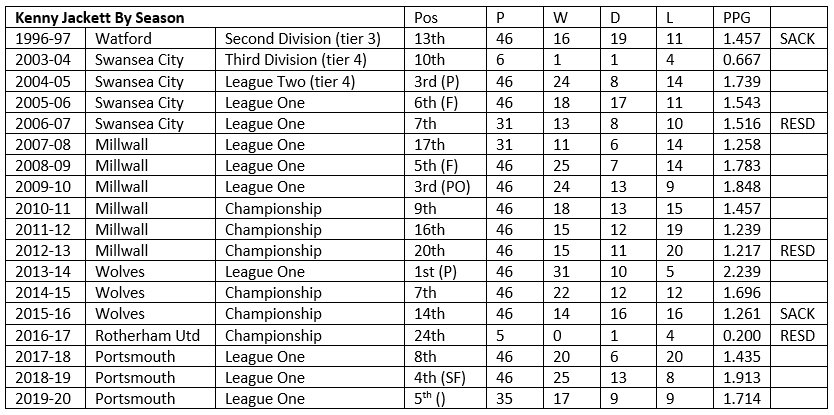
Key:
P = Promoted; R = Relegated; SF = Lost in play-off semi-final; F = Lost in play-off final; PO = Won play-off final; D = Demoted.
Figures are league games only; cup matches and play-offs are not included.
League position shown is either the position at the end of the season or the position at the time of departure.

Writer: Scotimp
If you haven’t already had a go at our quizzes, this is a great way to learn some random information about the Football Club, as well as helping us generate much-needed page views: Quiz No.1, Quiz No.2, Quiz No.3, Quiz No.4, Quiz No.5, Quiz No.6, Quiz No.7, Quiz No.8, Quiz No.9, Quiz No.10, Quiz No.11, Quiz No.12, Quiz No.13, Quiz No.14, Quiz No.15, Quiz No.16, Quiz No.17, Quiz No.18, Quiz No.19, Quiz No.20, Quiz No.21, Quiz No.22, Quiz No.23, Quiz No.24, Quiz No.25, Quiz No.26, Quiz No.27, Quiz No.28, Quiz No.29 and Quiz No.30.
Who Are The League One Managers?
No.18: Kenny Jackett (@Pompey):https://t.co/B1w6k7Aa2X#Pompey #Portsmouth pic.twitter.com/e1vUzCj1f6
— Vital Lincoln City (@VitalLincoln) September 5, 2020
https://www.facebook.com/VitalLincolnCity/posts/3246844835351739
